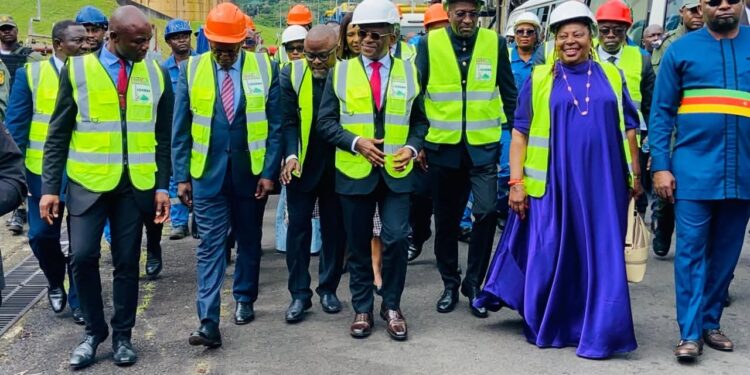 Story, Louvier Kindo Tombe
Story, Louvier Kindo Tombe
As the waves crash gently against Limbe’s shore, the silhouette of the SONARA refinery stands, half-silent, half-stirring, like a wounded giant waiting to rise again.
On Thursday, October 9, 2025, that long-awaited spark of revival returned when Prime Minister Chief Dr. Joseph Dion Ngute visited the site with a message that resonated far beyond the refinery walls: “SONARA is not dead — President Biya stands firmly behind its rebirth.”
More than a technical mission, the visit carried the symbolism of national resilience. SONARA, Cameroon’s only refinery, has been dormant since the 2019 inferno that gutted its core production units. Yet six years on, its workers have refused to abandon ship, a rare display of loyalty and endurance in an era when many state enterprises collapse quietly.
The Prime Minister, visibly impressed by the spirit of the staff, compared their determination to “picking up the gun again”, a metaphor for courage in the face of adversity.
His words lit up the refinery yard, drawing cheers from workers who have spent years maintaining idle machines, hoping for this very moment.
“As long as I’m Prime Minister,” he vowed, “SONARA will have my total support.”
That declaration, coming in the heat of a presidential campaign, was not just administrative assurance. It underscored President Paul Biya’s enduring focus on economic sovereignty and national pride.
Behind the renewed optimism lies a concrete roadmap. SONARA’s General Manager, El Hadj Bako Harouna, unveiled the PARAS24 project, an ambitious 24-month rehabilitation plan that aims to restart refining by 2027.
Backed by French engineering firm EQIUM, the project will restore roughly 80% of the damaged installations.
“We see this as more than rebuilding a plant,” Bako Harouna said. “We are rebuilding confidence, in SONARA, in our workforce, and in Cameroon’s industrial capacity.”
The plan has already attracted interest from financial partners, a sign that the refinery’s credibility endures. Workers call it “the second birth of SONARA.”
Cameroon’s reliance on imported refined petroleum has been draining national resources for six years. Each imported liter tells a story of vulnerability, the very dependency the refinery was meant to end. Dion Ngute captured the sentiment succinctly:
“When you do not control your energy, you depend on others, and they can decide your price, your pace, and your pain.”
By reviving SONARA, the government hopes to reclaim control of its energy destiny, slash import costs, and stabilize fuel prices across the subregion.
A visit that restored faith
The Prime Minister’s presence did more than inspect progress; it restored faith. Workers spoke with renewed optimism, some with tears of relief.
“For six years, we were unsure of our tomorrow,” said one technician. “Today, we feel seen. We feel we matter.”
Even the salt air seemed lighter as chants of “SONARA will rise again!” echoed through the compound, a fitting refrain for a refinery that symbolizes both national loss and national resilience.
SONARA’s story mirrors Cameroon’s, tested by crises, yet unbroken in spirit. As the sun set over Limbe’s horizon, the message of the day lingered: the fire that once consumed SONARA may have burned its walls, but not its will.
With the PARAS24 project now in motion and state support reaffirmed, the refinery’s comeback could mark one of Cameroon’s strongest statements of industrial renewal under President Biya’s leadership.
And perhaps, when SONARA’s first barrel rolls off the line again, it won’t just be oil, it will be a symbol of a nation that refused to surrender.








